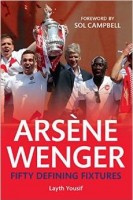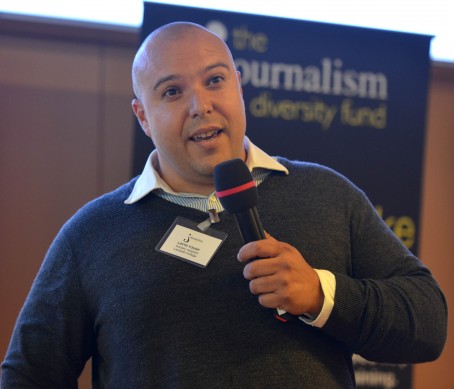 A late-entry regional journalist who thought the industry “didn’t want him” looks to have scored a spectacular career-enhancing goal after penning a new biography of Arsene Wenger.
A late-entry regional journalist who thought the industry “didn’t want him” looks to have scored a spectacular career-enhancing goal after penning a new biography of Arsene Wenger.
Layth Yousif failed to impress more than 100 editors with a plea for a job but now he’s winning over a new fan base with his tome on the Arsenal boss called Arsene Wenger: 50 Defining Fixtures.
The former bank office worker, eventually supported by the Journalism Diversity Fund after training at Lambeth College, has been commissioned to write the book on the French-born Gunners’ boss while working as a reporter for the Times & Citizen free weekly in Bedford.
The journalist, who’s freelanced for a host of Johnston Press titles in the Home Counties as well as The London Evening Standard before landing a permanent reporting role with the Hitchin Comet, spent the weekend at book-signing duty. (Oct 4/5).

Layth said: “The response has been phenomenal albeit very surreal. The initial print run sold out before the official publication date and I’ve had terrific reviews on Amazon and various football websites.
“The book has even been featured on Sky Sports, Four-Four-Two, The London Evening Standard, and Arsenal Fan TV.
“Tesco is already stocking it in its stores, and Arsenal Football Club are planning to stock it on rotation. There’s even been talk of a Chinese version.
“I interviewed Sol Campbell for the Evening Standard recently, and he kindly penned the foreword to my book – even he’s been asking me about how it’s selling.”
But the route to the edge of literary success could have been so different for Arsenal fan Layth.
His mum and dad arrived in Britain in the 1970s “without a penny to their name”, he said. “My parents had always instilled a strong work ethic in me and through my love of writing I had always wanted to be a journalist.
“It was through their help I managed to get the grades to go to Newcastle University.
“When I graduated I wrote to over 100 publications asking for a job. I had always spent summers doing work experience for local newspapers. When I failed to receive a single reply I fell into back office roles for various investment banks in the City.”
He admitted: “What I should have done – and it took me a long time to realise the fact – was to re-send those applications again and again and again, until someone did reply.
“Unfortunately I didn’t realise it at the time. I just thought journalism didn’t want me.”
Now Layth, with an NCTJ diploma in newspaper journalism, has been asked by his publishers, Amberely, to write an additional Arsenal book next year with another on England’s participation at Euro 2016 also proposed.
He added: “I love writing, and being an author is hugely fulfilling as well as being great fun – but I never want to lose sight of my day-to-day journalism work as a news, business and sports reporter which for me is the main thing.”

 Follow HTFP on Twitter
Follow HTFP on Twitter
Speaking as one who got a lucky break before industry went into meltdown I think it is disgusting papers do not even reply.
Anyway, sadly, papers are not interested in mature hacks. Cheap kids and free sent in crap copy are the norm. Good luck with book.
Report this comment
I met Layth earlier this year when he was freelancing for JP. I’m in no position to comment on his journalistic abilities but I was struck by his enthusiasm; he really wanted to make things happen. I’m delighted to read he now has a permanent position and that the book’s doing well. Well done, Layth.
Report this comment
Well done Layth. Would you do anything differently next time round? As an Editor, you know when you get a “round robin” application out of the blue. You get them from all over the world. Of course you should reply (by email), but if you are doing your job properly you already have a list of your next potential recruits, people you have known through work experience before and during university and journalism college. I wouldn’t suggest sending out 100 applications, particularly for entrants who are a bit older. Target perhaps five in a geographical area you know and where your contacts are. Less is more. And yes, follow up (without pestering) with a cheery call or email.
Report this comment